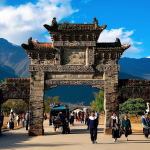《五人墓碑记》原文

五人者,盖当蓼洲周公之被逮,激于义而死焉者也。至于今,郡之贤士大夫请于当道,即除魏阉废祠之址以葬之;且立石于其墓之门,以旌其所为。呜呼,亦盛矣哉!
夫五人之死,去今之墓而葬焉,其为时止十有一月耳。夫十有一月之中,凡富贵之子,慷慨得志之徒,其疾病而死,死而湮没不足道者,亦已众矣;况草野之无闻者欤!独五人之皦皦,何也?
予犹记周公之被逮,在丁卯三月之望。吾社之行为士先者,为之声义,敛赀财以送其行,哭声震动天地。缇骑按剑而前,问:“谁为哀者?”众不能堪,抶而仆之。是时以大中丞抚吴者为魏之私人毛一鹭,公之逮所由使也;吴之民方痛心焉,于是乘其厉声以呵,则噪而相逐。中丞匿于溷藩以免。既而以吴民之乱请于朝,按诛五人,曰颜佩韦、杨念如、沈扬、马杰、周文元,即今之傫然在墓者也。
然五人之当刑也,意气扬扬,呼中丞之名而詈之,谈笑以死。断头置城上,颜色不少变。有贤士大夫发五十金,买五人之脰而函之,卒与尸合。故今之墓中全乎为五人也。
嗟乎!大阉之乱,缙绅而能不易其志者,四海之大,有几人欤?而五人生于编伍之间,素不闻诗书之训,激昂大义,蹈死不顾,亦曷故哉?且矫诏纷出,钩党之捕遍于天下,卒以吾郡之发愤一击,不敢复有株治;大阉亦逡巡畏义,非常之谋难于猝发,待圣人之出而投缳道路,不可谓非五人之力也。
由是观之,则今之高爵显位,一旦抵罪,或脱身以逃,难于复践其位者,岂不愧哉?是以蓼洲周公忠义暴于朝廷,赠谥褒美,显荣于身后;而五人亦得以加其土封,列其姓名于大堤之上,凡四方之士无不有过而拜且泣者,斯固百世之遇也。不然,令五人者保其首领,以老于户牖之下,则尽其天年,人皆得以隶使之,安能屈豪杰之流,扼腕墓道,发其志士之悲哉!故予与同社诸君子,哀斯墓之徒有其石也,而为之记,亦以明死生之大,匹夫之有重于社稷也。
贤士大夫者,冏卿因之吴公,太史文起文公、孟长姚公也。
中文翻译
这五个人,就是当周蓼洲先生被阉党逮捕时,为正义所激奋而死于这件事的。到了现在,本郡有声望的士大夫们向有关当局请求,就清理已被废除的魏忠贤生祠旧址来安葬他们;并且在他们的墓门之前竖立碑石,来表彰他们的事迹。啊,也真是盛大隆重啊!
这五人的死,距离现在建墓安葬,时间不过十一个月罢了。在这十一个月当中,大凡富贵人家的子弟,意气豪放、志得意满的人,他们因患病而死,死后埋没不值得称道的人,也太多了;何况乡间没有声名的人呢?唯独这五个人声名光荣显耀,为什么呢?
我还记得周公被捕,是在丁卯年三月十五日。我们社里那些道德品行可以作为读书人的表率的人,替他伸张正义,募集钱财送他起程,哭声震天动地。差役们按着剑柄上前,问:“在为谁悲痛?”大家不能再忍受了,把他们打倒在地。当时以大中丞职衔作应天府巡抚的是魏忠贤的私党毛一鹭,周公被捕就是由他主使的;苏州的老百姓正在痛恨他,这时趁着他厉声呵骂的时候,就一齐喊叫着追赶他。这位大中丞藏在厕所里才得以逃脱。不久,他以苏州人民发动暴乱的罪名向朝廷请示,追究这件事,杀了五个人,他们是颜佩韦、杨念如、沈扬、马杰、周文元,就是现在一起埋葬在墓中的这五个人。
然而,当五个人临刑的时候,神情慷慨自若,呼喊着中丞的名字骂他,谈笑着死去了。砍下的头放在城头上,脸色一点也没改变。有位有名望的人拿出五十两银子,买下五个人的头并用木匣装起来,最终与尸体合到了一起。所以现在墓中是完完整整的五个人。
唉!当魏忠贤作乱的时候,做官的人能够不改变自己志节的,中国之大,能有几个人呢?但这五个人生于民间,从来没受到过诗书的教诲却能被大义所激励,踏上死地也不回头,又是什么缘故呢?况且当时假托的皇帝的诏书纷纷传出,追捕同党的人遍于天下,终于因为我们苏州人民的发愤抗击,使阉党不敢再株连治罪;魏忠贤也迟疑不决,畏惧正义,篡夺帝位的阴谋难于立刻发动,直到当今的皇上即位,(魏忠贤畏罪)吊死在路上,不能不说是这五个人的功劳呀。
由此看来,那么如今这些高官显贵们,一旦犯罪受罚,有的脱身逃走,不能被远近各地所容纳;也有的剪发毁容、闭门不出,或假装疯狂不知逃到何处的,他们那可耻的人格,卑贱的行为,比起这五个人的死来,轻重的差别到底怎么样呢?因此周蓼洲先生的忠义显露在朝廷,赠给他的谥号美好而光荣,在死后享受到荣耀;而这五个人也能够修建一座大坟墓,在大堤之上立碑刻名,所有四方的有志之士经过这里没有不跪拜流泪的,这实在是百代难得的际遇啊。不这样的话,假使让这五个人保全头颅,在家中一直生活到老,尽享天年,人人都能够像奴仆一样使唤他们,又怎么能让豪杰们屈身下拜,在墓道上扼腕惋惜,抒发他们有志之士的悲叹呢?所以我和我们同社的诸位先生,惋惜这墓前空有一块石碑,就为它作了这篇碑记,也用以说明死生意义的重大,(即使)一个普通老百姓对于国家也有重要的作用啊。
几位有声望的士大夫是:太仆卿吴因之先生,太史文文起先生,姚孟长先生。
英文翻译
These five men were those who, when Zhou Liuzhou (Zhou Qiyuan) was arrested by the eunuch clique, were so aroused by a sense of justice that they died for it. Up to now, the respectable gentry of the prefecture have petitioned the authorities in power. They have cleared away the site of the temple dedicated to Wei Zhongxian (which had been abolished) to bury them, and set up a stone tablet at the entrance of their tomb to honor what they did. Ah, how magnificent!
The death of these five men occurred only eleven months before this tomb was built. During these eleven months, among all the sons of the rich and powerful and those who were complacent with their success, there were quite a number who died of illness and were soon forgotten after their death. What more could be said of those unknown commoners? Yet it is only these five men whose names shine brightly. Why?
I still remember that Zhou was arrested on the fifteenth day of the third lunar month in the year Dingmao. Those in our society who were regarded as models for scholars came forward to speak up for justice, collected money to see him off, and their cries shook the heavens and the earth. The guards with swords in hand stepped forward and asked, "Who is crying for the deceased?" The crowd could not bear it any longer and beat them down. At that time, Mao Yilu, who held the post of Grand Coordinator of Suzhou on behalf of Wei Zhongxian, was the one who had ordered Zhou's arrest. The people of Suzhou were filled with indignation against him. Seizing the opportunity when he was barking orders angrily, they shouted and chased after him. The Grand Coordinator hid himself in a latrine and thus escaped. Soon after, he reported to the court that the people of Suzhou had started an uprising and asked for punishment. As a result, five men were executed. They were Yan Peiwei, Yang Nianru, Shen Yang, Ma Jie, and Zhou Wenyuan - the very five men now lying in this tomb.
However, when these five men faced execution, they were in high spirits. They cursed the name of the Grand Coordinator and died with smiles on their faces. Their heads were cut off and placed on the city wall, but their facial expressions remained unchanged. A respectable gentleman donated fifty taels of silver to buy the heads of the five men and put them in a coffin, and finally they were reunited with their bodies. So now there are five complete bodies in the tomb.
Alas! During the chaos caused by Wei Zhongxian, among all the officials, how many could keep their integrity and not change their minds? The country is so vast, yet there are only a handful of such people. But these five men were born among the common people and had never received any education from the Confucian classics. However, they were aroused by a great sense of justice and faced death without hesitation. What was the reason? Moreover, at that time, false imperial edicts were issued one after another, and the pursuit of those suspected of being in the same party as the eunuch clique spread all over the country. Finally, thanks to the indignant resistance of the people of Suzhou, the eunuch clique dared not carry out further mass arrests. Wei Zhongxian also hesitated and feared justice. His plot to usurp the throne could not be carried out overnight. It was not until the current emperor ascended the throne that he hanged himself on the road. It can be said that it was the achievement of these five men.
From this, we can see that nowadays, when those high - ranking officials and nobles are found guilty of a crime, some escape by fleeing and cannot be accepted anywhere far and near. Some even cut off their hair, ruin their appearance, shut themselves indoors, or pretend to be mad and no one knows where they have gone. Compared with the death of these five men, what is the difference in the lightness and heaviness of their despicable characters and mean behaviors? Therefore, since Zhou Liuzhou's loyalty and righteousness were made known to the court, he was posthumously awarded a glorious title and enjoyed honor after his death. And these five men were also able to build a large tomb, have their names inscribed on the embankment, and all scholars from all directions who passed by would kneel down and weep. This is indeed a once - in - a - hundred - years' encounter. Otherwise, if these five men had been allowed to live until old age at home, enjoying their natural lifespan, and everyone could have ordered them around like servants, how could they have made the heroes bow their heads in the tomb passage and shed tears for the frustrated patriots? Therefore, I and my fellow members of the society feel sad that there is only a stone tablet in front of this tomb, so we wrote this inscription for it. It is also to show the great significance of life and death, and that even an ordinary commoner has an important role in the country.
The respectable gentry are: Grand Minister of the Court of Imperial Stables Wu Yinzi, Grand Historian Wen Qiweng, and Yao Mengchang.
背景补充
创作背景
明朝末年,宦官魏忠贤专权,他结党营私,排除异己,残酷迫害东林党人等正直之士,形成了阉党集团,搞得朝政混乱,民不聊生。天启六年(1626 年),魏忠贤派缇骑到苏州逮捕东林党人周顺昌(字蓼洲)。周顺昌为官清廉,深得民心,苏州百姓得知后,群情激愤,自发组织起来为他请愿。当缇骑强行逮捕周顺昌时,与群众发生冲突,打死一人。事后,魏忠贤以苏州百姓暴乱的罪名,派巡抚毛一鹭进行镇压,逮捕了颜佩韦、杨念如、沈扬、马杰、周文元五位义士,并将他们杀害。次年,崇祯皇帝即位,魏忠贤自缢而死,阉党失势。苏州百姓为了纪念这五位义士,将其安葬在虎丘山塘,并集资为他们建墓立碑。作者张溥与复社成员为五人写下了这篇碑记。
作者简介
张溥(1602 年 - 1641 年),字天如,号西铭,江苏太仓人,明代文学家。他自幼发奋读书,明史上记有他“七录七焚”的佳话,即读书时每读一篇,都亲自抄录,然后诵读,再烧掉,如此反复七次,因此他的书房名为“七录斋”。张溥是复社的领袖,主张“兴复古学”,希望通过复兴古学来挽救明朝的危亡。他组织复社成员开展文学活动,抨击阉党,议论朝政,在当时产生了很大的影响。他的文章以“兴复古学”为宗旨,注重实用,风格质朴。除《五人墓碑记》外,他的代表作还有《七录斋集》等。
文章主旨
文章通过记述五位义士为周顺昌鸣不平而慷慨赴义的事迹,歌颂了他们不畏强暴、敢于抗争、舍生取义的精神,同时也批判了阉党的罪恶和那些在阉党淫威下屈膝投降的官员的无耻行径。作者强调了普通百姓在维护正义、反抗邪恶方面所起的重要作用,指出即使是普通百姓,他们的生死抉择也关系到国家的兴衰和社稷的安危,具有深刻的思想意义和社会价值。












评论功能已关闭。